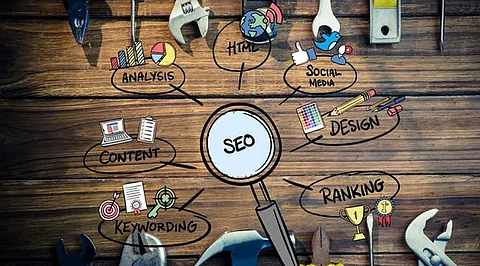

In today’s fast-paced digital landscape, law firms are constantly looking for innovative ways to enhance their online presence and attract new clients. AI-powered SEO (Search Engine Optimization) has emerged as a game-changer in legal marketing, enabling firms to optimise their websites, content, and strategies more efficiently and effectively. Here are five ways AI is revolutionising legal marketing and why law firms should embrace this technology.
AI-powered SEO tools use sophisticated algorithms to analyse search behaviour and identify trending keywords relevant to your practice area. For example, AI can track how potential clients are searching for legal services, including long-tail keywords and questions they may be asking. This enables law firms to create content that directly aligns with search intent, ensuring their websites appear in search results when clients need them the most. By targeting the right keywords, AI helps increase visibility, drive organic traffic, and boost the likelihood of client conversions.
Content is crucial to Law Firm SEO success, but creating high-quality, relevant content consistently can be time-consuming. AI-powered tools help streamline the content creation process by generating topic ideas based on search trends and user behaviour. Moreover, AI can optimise your content for readability, keyword density, and structure, ensuring it performs well on search engines. For example, AI can suggest adjustments to content, like adding semantically relevant terms, improving the content flow, and structuring it to meet Google’s E-A-T (Expertise, Authority, Trustworthiness) guidelines. This not only boosts SEO rankings but also engages potential clients effectively.
AI enables law firms to deliver a more personalised experience for visitors to their website. Through machine learning algorithms, AI can analyse user behaviour and tailor content recommendations based on a visitor’s interests or past interactions. For example, if a user visits a page about personal injury law, AI might recommend related articles or call-to-action buttons to schedule a consultation. Personalization improves user engagement and increases the likelihood that potential clients will take the desired actions, such as filling out contact forms or making a call.
On-page SEO involves optimising individual web pages to rank higher and earn more relevant traffic. AI-powered tools can automate many aspects of on-page optimization, such as analysing meta descriptions, headings, and images. These tools can also identify technical SEO issues like broken links, slow page load times, or mobile optimization problems, ensuring your website is user-friendly and easily crawlable by search engines. By automating these tasks, AI helps law firms focus more on content strategy and client engagement while improving website performance and rankings.
AI is incredibly adept at analysing large volumes of data, providing law firms with deep insights into the performance of their SEO efforts. Through AI-powered analytics tools, firms can track how their keywords are performing, identify top-performing pages, and understand user behaviour patterns. These insights can inform future SEO strategies, helping firms refine their approach, improve conversion rates, and identify new growth opportunities. Additionally, AI can predict future trends and suggest optimizations, ensuring your law firm remains competitive in an ever-evolving digital landscape.
For many law firms, local visibility is crucial to attracting clients. AI-powered tools are highly effective at improving local SEO strategies by optimising for geo-targeted search queries. AI can analyse location-based search data and help your firm appear in local searches by improving your Google My Business (GMB) profile, managing local listings, and ensuring consistency across various online directories. AI can also suggest content and keywords tailored specifically to a particular geographic region, helping law firms rank higher in location-based searches.
AI tools can also track local search trends, offering insights into the types of legal services that are most in demand in specific regions. This allows law firms to tailor their content to meet the specific needs of their local community and adapt to regional fluctuations in search volume.
AI-powered chatbots have become an increasingly popular tool for law firms, enhancing client engagement and lead generation. Chatbots can instantly respond to website visitors, answering common questions about legal services, practice areas, and fee structures. This not only improves user experience but also helps capture leads in real-time. AI chatbots can also schedule consultations, qualify leads, and follow up with potential clients, ensuring that no inquiry goes unanswered.
Moreover, AI-driven chatbots are constantly learning from past interactions, which allows them to become increasingly effective in handling more complex inquiries. This provides clients with a seamless experience while freeing up your staff to focus on more pressing tasks, thus improving operational efficiency.
AI can conduct real-time competitive analysis, helping law firms understand where they stand relative to their competitors. By examining competitors' websites, SEO strategies, and keyword rankings, AI tools can provide valuable insights into what is working for other firms in your practice area. This data allows law firms to identify growth opportunities, refine their own strategies, and even capitalize on weaknesses in their competitors' approaches.
AI can also assist in benchmarking your law firm’s performance over time, providing insights into areas where your SEO efforts are excelling and areas that need improvement. By consistently monitoring your competitors and adjusting your strategies accordingly, AI ensures that your law firm stays ahead of the curve in a competitive legal market.
AI-powered SEO and PPC are transforming legal marketing by making it more efficient, personalised, and data-driven. From improving keyword targeting to automating on-page optimization and enhancing the client experience, AI offers numerous benefits to law firms looking to stay ahead in the competitive online legal market. By leveraging AI, law firms can boost their search engine rankings, drive qualified traffic through smart legal PPC campaigns, and ultimately, attract more clients. Embrace AI-powered SEO and PPC to elevate your firm's digital presence and build a strong foundation for long-term success in legal marketing.
